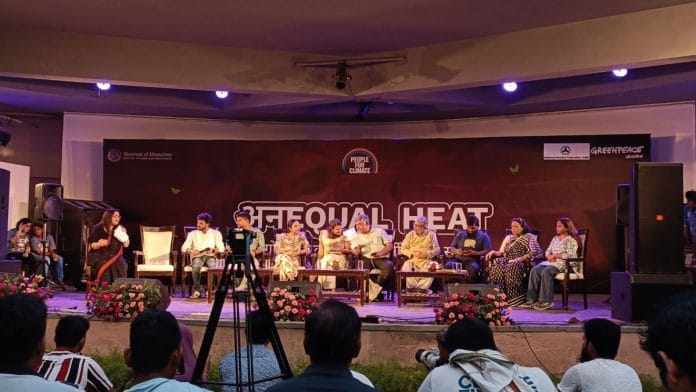New Delhi: Delhi band Manzil Mystics drowned out the whirr of air coolers in the room as they belted out song after song in what was meant to be a “musical dialogue on climate change”. As the audience at Triveni Kala Sangam cheered and clapped, a group of street vendors stood up to dance. They were the ‘chief guests’ of the event organised by Greenpeace India—‘Unequal Heat: Community Voices on Heatwave’.
But the event on 14 June was more than just a music performance in an artificially cooled room. Greenpeace India unveiled its latest report on the impact of heatwaves on Delhi’s street vendors, which was followed by a panel discussion on climate justice, inequality and how heat waves—like all natural disasters—affect the marginalised and the poor more than other sections of society.
“Discussions about climate change have always been relegated to experts and governments. We want to open it up to the community, and highlight those voices that experience heatwaves firsthand but are rarely involved in the policymaking process,” said project coordinator Selomi Garnaik.
The NGO tied up with the National Hawker Federation Delhi, and surveyed more than 700 street vendors for the report, ‘Heat Havoc: Investigating the Impact on Street Vendors’. The aim was to not only assess how they were coping with the heatwave but also to find what resources were available to them — in the form of access to water, shelter and medical aid in case of heat stroke or other emergencies.
Almost 69 per cent of respondents said they had not heard of the term ‘heatwave’ before. Only 9.56 per cent said they were even aware that Delhi had a Heat Action Plan.
“This survey informed us that it was the first time most street vendors had even asked about their health during heatwaves,” said Selomi.
Heatwaves impact more than just health
Unlike a tsunami or an earthquake or flooding, where death and destruction are violently visible, heatwaves are not considered natural disasters in India. And Greenpeace India wants to change that.
Over 70 per cent of vendors surveyed said they experienced higher levels of irritability when temperatures soared. And more than 60 per cent experienced headaches, dehydration, sunburn and fatigue.
“It illustrates the need for urgent policy interventions for the health and well-being of the citizens,” said Selomi.
In the panel discussion that followed the launch of the report, environmental lawyers, activists, policymakers, representatives of street vendor and waste-picker communities as well as other unorganised sectors spoke about the hardships people from the informal sector face during extreme weather events.
“No one should have to sacrifice their health just to earn a living income,” said Avinash Chanchal, a climate activist and one of the panellists. Heatwaves, he added, impact not just the health but the productivity and therefore the incomes of many informal sector workers.
Also read: Climate change adding 50 to 80 warmer nights each year to Indian summers, study finds
Women most vulnerable
Studies from all over the world point to one fact—among the marginalised and those working in the informal sector, women are the most vulnerable to climate change.
“No one even talks about the heat experienced by women in the kitchen. It basically becomes a pressure cooker,” said climate activist Deepali Tong, who was part of the panel discussion. She gave the example of an 18-year-old woman from Sundar Nagar, who works with her brother at their family’s sugarcane stall during the seasonal sugar season. She is at the stall at 8 am, can’t take breaks even when she’s menstruating and has to help her mother with household chores before retiring for the night.
“Not only is women’s labour in the household difficult and exposes themselves to health risks during extreme weather, it is also unacknowledged by policymakers and the general public,” said Tong.
This intersection of existing societal norms with climate change impacts was also put forth by Sandeep Verma, the convenor of the National Hawker Federation in Delhi. The Heatwave Havoc report found that 82.74 per cent of vendors lack guidance on managing heatwaves, and 71.05 per cent struggle to access medical help during emergencies.
“When there’s a water crisis in summer, it is Geeta Colony that faces the shortage, not Vasant Vihar,” added Tong.
Aam Aadmi Party (AAP) Rajya Sabha MP Sanjay Singh later joined the discussion. He listened to the problems raised by the panellists, as well as those highlighted by the street vendors and informal sector workers present at the event.
“We need a place to rest. We need heat shelters with water and medicines for those suffering heat stress. And we need it on every road,” said Verma to Singh.
(Edited by Zoya Bhatti)






